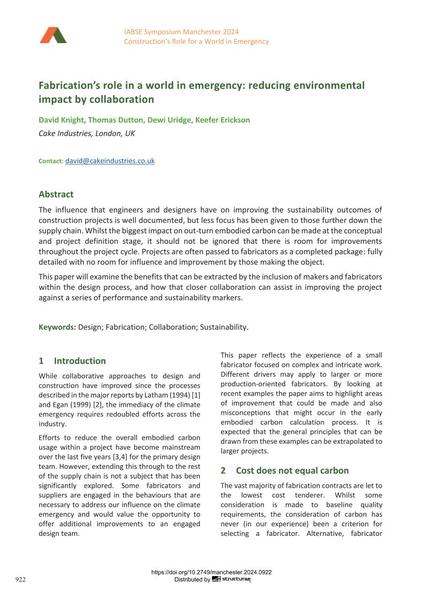Fabrication’s role in a world in emergency: reducing environmental impact by collaboration

|
|
|||||||||||
Détails bibliographiques
| Auteur(s): |
David Knight
(Cake Industries, London, UK)
Thomas Dutton (Cake Industries, London, UK) Dewi Uridge (Cake Industries, London, UK) Keefer Erickson (Cake Industries, London, UK) |
||||
|---|---|---|---|---|---|
| Médium: | papier de conférence | ||||
| Langue(s): | anglais | ||||
| Conférence: | IABSE Symposium: Construction’s Role for a World in Emergency, Manchester, United Kingdom, 10-14 April 2024 | ||||
| Publié dans: | IABSE Symposium Manchester 2024 | ||||
|
|||||
| Page(s): | 922-928 | ||||
| Nombre total de pages (du PDF): | 7 | ||||
| DOI: | 10.2749/manchester.2024.0922 | ||||
| Abstrait: |
The influence that engineers and designers have on improving the sustainability outcomes of construction projects is well documented, but less focus has been given to those further down the supply chain. Whilst the biggest impact on out-turn embodied carbon can be made at the conceptual and project definition stage, it should not be ignored that there is room for improvements throughout the project cycle. Projects are often passed to fabricators as a completed package: fully detailed with no room for influence and improvement by those making the object. This paper will examine the benefits that can be extracted by the inclusion of makers and fabricators within the design process, and how that closer collaboration can assist in improving the project against a series of performance and sustainability markers. |
||||
| Mots-clé: |
design durabilité
|
||||
